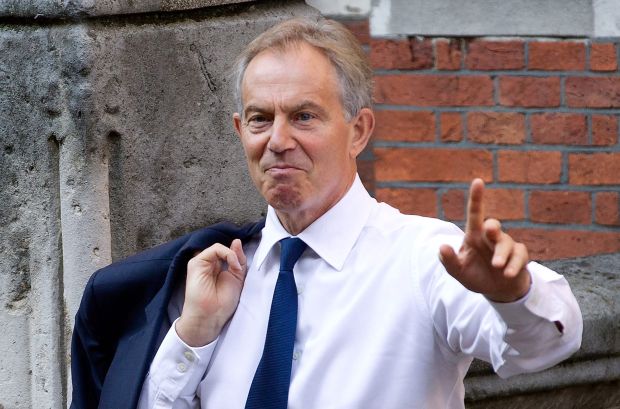All wings of the Labour Party which support the notion of the Labour Party as a Party aspiring to govern, rather than as a fringe protest movement agree on the tragedy of the Labour Party’s current position. But even within that governing tendency, there is disagreement about the last Labour Government, what it stood for and what it should be proud of.
The moral dimension of Labour tradition has always been very strong, encapsulated in the phrase that the Labour Party owed more to Methodism than to Marx. When I became the Opposition spokesman on law and order in 1992, following our fourth election defeat, I consciously moved us away from a ‘civil liberties’ paramount approach, to one that started with the rights of the victim, their pain, their suffering, and put first our moral responsibility to stand with them. Of course the two shouldn’t be in conflict. But nonetheless – tonally at least – I shifted our position and did it for moral as well as political reasons.
I also revitalised the notion of community, of the importance of family ties, things which in the 1960s had become more associated with the Tories, but which actually had strong roots in Labour working class communities. When we re-wrote the Party’s constitution we put as the central tenet: ‘By our common endeavour we achieve more together than we do alone.’ So we retained the ‘social’ part of socialism, but effectively discarded the ideological one. We distinguished between State and social action.
So the values part of New Labour was very well articulated. Still today, many of those who did not agree with the later actions of the Labour Government like this moral stance; even if they came to believe that over time we lost that imperative. So having asserted the importance of public services, we then, they say, became obsessed with introducing the market to them, thus diluting their values. In wanting to prove our ‘business’ credentials, we believed the private sector could do no wrong. In supporting America post 9/11, especially under a Republican President, we became fellow travellers of the ‘neo-Cons’, rather than champions of peace. I have never written about this in this way before; but let me explain how my thinking developed and why.
Until 1997, the Labour Party had been in existence roughly 100 years. But during that time, it had rarely been in Government. In fact, at that point, it had never won two full terms of power, let alone three; not with even the Attlee Government. This was because we could win power by dint of the unpopularity over time of a Conservative Government; by appealing to the need for change; and by burnishing our values as better and in a sense more moral than those of the Tories.
But the problem was that once in Government, where hard choices had to be made, and where supporters had to be disappointed as well as indulged, we fell short. In particular, significant elements of the Party saw the process of governing with all its compromises, pragmatism and embrace of changing times as implicit betrayal of our principles.
We were sometimes more defenders of the status quo than changers of it; and where we made change it could be less driven by practicality and more by ideology. At our best – as with the creation of the NHS – idealism and realism came together perfectly. But elsewhere, as with our adherence to the nationalisation of industries long after it was clear it was inefficient, or the refusal to countenance a legal framework for unions, we confused defending interests with defending values. In this way we fought for the traditional methods of doing things even though it was clear on hard-headed analysis that those methods stood in the path of progress for those we claimed to represent. As a result, the public liked what we stood for in broad terms, but distrusted us as a Party of Government.
I wanted this to change profoundly. I could see that the chief characteristic of the modern world was the scope, scale and speed of change. So our values had to be applied in that context. What’s more, we had to apply them rigorously, unafraid to challenge old thinking even if it came from within. And where there were new problems and new contexts we had to be first to face up to them, again with rigour.
Above all, in a society in which fewer and fewer people thought of themselves as traditional working class, we needed to build a new coalition between the aspirant up and coming and the poorest and most disadvantaged. For the task of winning power, the emphasis on the values of community, society, family, compassion and social justice was highly effective.
But for the task of governing, we had to do more than proclaim our values, we had to have the courage and creativity to apply them anew to a changing world and make what counted what worked rather than defending interests or tradition.
This took time. Often in the first term, though we remained politically popular, we were not taking brave decisions; we were content to manage the existing system, albeit with rhetoric which reflected our different values. Some reforms like the minimum wage, introduced in the UK for the first time and done with the support of business, really did change lives. Bank of England independence, devolution and the first London Mayor, peace in Northern Ireland, civil partnerships – all of these represented major change; and progress.
But in public services, welfare, crime and pensions, we were at first timid. With experience in governing and with an attitude which was open to change irrespective of ideology, we then began to make change which was much more radical. Hence the drive for health and education reform, culminating in the opening up of the health service providers to competition, including provision in the private sector and the Academy schools; Public Private Partnerships for the renewal of the nation’s infrastructure; the anti-social behaviour legislation; and even ID cards to control illegal immigration. We spearheaded inner city regeneration; mounted what was an audacious bid to host the Olympics; targeted socially excluded families who were causing community problems; in short, we pushed the frontier of what the Labour Party was supposed to be about. We were proud of our iconoclasm.
The ‘We’ I accept was not everyone; but we should never forget David Miliband won a clear majority of the Party membership in the leadership election of 2010. But the results were often dramatic. The school reforms – as in London – were transformative. By 2007 – hard to believe now – we had satisfaction rates in the NHS higher than at any time since it was created. Crime fell, not by a little, but by over 30%.
Of course we made mistakes. But we were a radical reforming Government. And we tried to put the moral purpose of the Labour Party into practice, the only sort of morality worth very much.
If schools were failing their pupils and we came, on analysis, to believe that the structure of the school system was to blame, then the moral solution was to change the structure, not to keep it because of local government or union pressure. If we could, by reform, give patients in the NHS the same quality of service that those with wealth could afford in the private sector, then it was our moral duty to do so. If the criminal justice system was failing victims of crime and those victims were often from the poorest parts of town, then it was social justice to reform the system.
Yes, we forged a strong link with the private sector, we encouraged science and technology, and we celebrated London as a financial centre. But we did this because we knew that without a growing economy life would be harder for those at the bottom.
We didn’t spot the financial crisis – along with the rest of the world. It was more an absence of understanding than an absence of a will to regulate which was the issue. But the essential position we occupied in British politics retained appeal which is why we not only won a third term in 2005, we were never in any real danger of not getting it.
Post 9/11 I became convinced that Islamist extremism was the security issue of our time. People can agree or disagree with the decisions which I took and the emphasis I put on the partnership with the USA, but I took them not in defiance of progressive politics but in furtherance of them.
I believed then and believe now that this extremism is a modern form of fascism, albeit one based on religious doctrine and that we’re engaged in a global war against it. But the point is for these purposes I didn’t start as one type of leader and end as another in terms of my values. What changed was my experience of governing led me to solutions which became over time more radical and less traditional.
My essential argument – and indeed with my own Party today – is that this approach is not now redundant with time. It is even more critical. The pace of change is not slowing; it is accelerating. The next generation of technological advance – big data, possibly in time AI – will be akin to yet another industrial revolution except that this time it will affect the service sector too.
We have to understand it and prepare for it. Infrastructure, housing, social exclusion – all these challenges require more modernising and less ideological thinking. Macro-economic policy particularly the impact of Quantitative Easing and its relationship with fiscal policy and what is the right regulatory framework for banking which protects us as far as possible from crisis, but also recognises the cardinal importance to a thriving economy of a thriving financial sector, should be a huge topic of debate in progressive circles. It barely features.
Right now we’re in danger of not asking the right questions never mind failing to get the right answers. All of it is about applying values with an open mind; not boasting of our values as a way of avoiding the hard thinking the changing world insists upon.
Many – especially in today’s Labour Party – felt we lost our way in Government. I feel we found it. But I accept in the process we failed to convince enough people that the true progressives are always the modernisers, not because they discard principle but because they have the courage to adhere to it when confronted with reality.






Comments